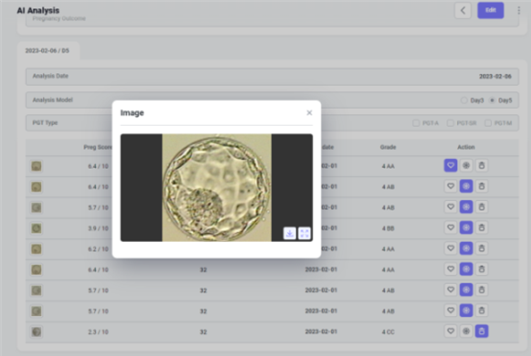Seoul National University Bundang Hospital (SNUBH) announced that its researchers have secured 1.6 billion won ($1.18 million) in research funding for conducting clinical research using artificial intelligence (AI) to select the best embryos for implantation during in vitro fertilization (IVF).

Professor Lee Jung-ryeol of Obstetrics and Gynecology at SNUBH will lead the research project, which will be conducted in collaboration with researchers from Kai Health.
The Pan-Ministerial Medical Device R&D Project, jointly promoted by the Ministry of Science and ICT, the Ministry of Trade, Industry and Energy, the Ministry of Health and Welfare, and the Ministry of Food and Drug Safety, supports the entire medical device research and development cycle.
Recently, the number of infertile patients has increased steeply due to delayed marriages and later childbearing ages, resulting in one in 10 newborns being born through IVF procedures.
However, IVF is known to be physically and mentally demanding, with a success rate as low as 30 percent per cycle. Furthermore, if the pregnancy is not successful, IVF requires a waiting period of 2-3 months before the next round of IVF can begin.
Therefore, it is necessary to select embryos with high fertility to increase the success rate. Clinical embryologists are trained to look at healthy embryos under a microscope, but this still falls short for many clients, with a 37 percent pregnancy success rate.

Consequently, the AI screening system developed by Kai Health has demonstrated its ability to identify high-quality embryos more objectively, economically, and non-invasively based on trained data, increasing the pregnancy prediction rate to approximately 65 percent. The joint research team plans to prove the clinical utility of this AI model through this project and further optimize the model for medical device certification and conduct clinical studies.
This project is expected to span three years, during which high-quality domestic and international data will be collected and analyzed to develop an optimized AI-based model for medical device approval. In the first year, efforts will focus on preparing the model, followed by clinical trials on infertile patients at SNUBH in the second year. In the third year, the team aims to secure approval as an innovative medical technology through an integrated review of innovative medical devices.
"There have been attempts to use AI for optimal embryo selection in IVF procedures, but this is the first time in Korea that we have entered clinical research based on commercial-level technology," Professor Lee noted.
Related articles
- 40% of cancer patients at Seoul's Big 5 hospitals come from provinces
- Seoul National University Bundang Hospital unveils cutting-edge online consultation system for patients and guardians
- Risk of early-onset colorectal cancer 20% higher for heavy drinkers: study
- 'Digital devices help boost immunity after influenza vaccination'
- SNUBH CEO vows to create a leading model in patient care
- Childhood trauma can lead to severe mental illness in adulthood: study
- SNUBH's hotline system eases anxiety of stroke patients
- SNUBH unveils 2023 Outcomes Book with enhanced medical transparency, quality

